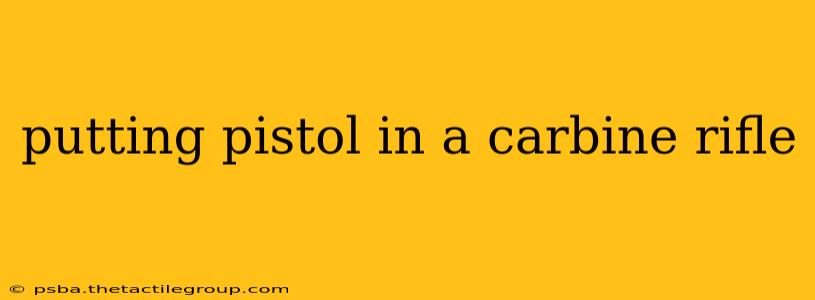The combination of pistol calibers and carbine-length platforms has gained significant popularity among firearm enthusiasts. This setup offers a unique blend of firepower and maneuverability, appealing to both recreational shooters and those seeking a versatile self-defense option. This guide delves into the intricacies of pistol-caliber carbines (PCCs), exploring their design, advantages, and considerations.
Understanding Pistol Caliber Carbines (PCCs)
A pistol-caliber carbine is essentially a rifle-length firearm chambered in a pistol cartridge, such as 9mm, .40 S&W, .45 ACP, or 10mm. Unlike traditional rifles using cartridges like .223 Remington or 5.56x45mm NATO, PCCs leverage the readily available and generally less expensive ammunition associated with handguns. This often translates to lower shooting costs per round.
The key advantages of PCCs stem from their design:
-
Reduced Recoil: Compared to rifles firing higher-powered cartridges, PCCs generally exhibit less recoil, making them easier to handle, especially for new shooters or those with less upper body strength. This reduced recoil enhances controllability and allows for faster follow-up shots.
-
Increased Capacity: PCCs typically feature higher-capacity magazines than handguns chambered in the same caliber, providing a greater number of rounds before reloading. This increased capacity is especially beneficial in self-defense scenarios or competitive shooting.
-
Improved Accuracy: The longer barrel length of a carbine significantly improves accuracy compared to a handgun, resulting in tighter shot groups at longer ranges. The stability offered by the longer barrel and stock also contributes to improved accuracy.
-
Versatility: PCCs can be customized extensively with accessories like optics, lights, and stocks, adapting them to various roles and shooting styles. This adaptability makes them suitable for home defense, competition shooting, or even hunting small game.
Choosing the Right PCC: Key Considerations
Selecting the ideal PCC involves considering several factors:
-
Caliber Selection: The choice of caliber depends on individual preferences and intended use. 9mm is a popular choice due to its affordability, availability, and relatively low recoil. .45 ACP offers greater stopping power but with increased recoil. .40 S&W sits somewhere in between.
-
Magazine Capacity: Higher-capacity magazines provide a tactical advantage, but also add to the overall weight and dimensions of the firearm. Consider your needs and local regulations regarding magazine capacity.
-
Ergonomics: A comfortable and well-balanced firearm is crucial for accuracy and effective shooting. Consider the weight, length, and grip angle before purchasing.
-
Reliability: Select a PCC from a reputable manufacturer known for producing reliable firearms. Look for reviews and feedback from other users.
-
Features and Accessories: Assess the availability of aftermarket accessories, such as stocks, sights, and optics, that might enhance your shooting experience.
Safety Precautions: Handling and Storage
Safe handling and storage are paramount when dealing with any firearm. Always treat every firearm as if it were loaded. Follow these crucial safety guidelines:
-
Proper Handling: Keep your finger off the trigger until ready to fire. Always be aware of your target and what's beyond it.
-
Safe Storage: Store firearms securely, unloaded, and out of the reach of children and unauthorized individuals. Consider using a gun safe or locking device.
-
Regular Cleaning and Maintenance: Regular cleaning and maintenance are essential for ensuring the reliability and longevity of your firearm.
Conclusion: The Power and Precision of Pistol Caliber Carbines
Pistol caliber carbines offer a compelling combination of firepower, maneuverability, and affordability. By carefully considering the factors discussed above, you can choose a PCC that meets your specific needs and enhances your shooting experience. Remember, responsible gun ownership involves prioritizing safety, understanding your firearm, and adhering to all relevant laws and regulations. This guide offers a starting point for your research; further exploration and consultation with experienced firearms professionals are always recommended.

